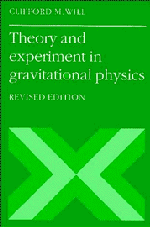Book contents
- Frontmatter
- Contents
- Preface to Revised Edition
- Preface to First Edition
- 1 Introduction
- 2 The Einstein Equivalence Principle and the Foundations of Gravitation Theory
- 3 Gravitation as a Geometric Phenomenon
- 4 The Parametrized Post-Newtonian Formalism
- 5 Post-Newtonian Limits of Alternative Metric Theories of Gravity
- 6 Equations of Motion in the PPN Formalism
- 7 The Classical Tests
- 8 Tests of the Strong Equivalence Principle
- 9 Other Tests of Post-Newtonian Gravity
- 10 Gravitational Radiation as a Tool for Testing Relativistic Gravity
- 11 Structure and Motion of Compact Objects in Alternative Theories of Gravity
- 12 The Binary Pulsar
- 13 Cosmological Tests
- 14 An Update
- References
- References to Chapter 14
- Index
1 - Introduction
Published online by Cambridge University Press: 04 April 2011
- Frontmatter
- Contents
- Preface to Revised Edition
- Preface to First Edition
- 1 Introduction
- 2 The Einstein Equivalence Principle and the Foundations of Gravitation Theory
- 3 Gravitation as a Geometric Phenomenon
- 4 The Parametrized Post-Newtonian Formalism
- 5 Post-Newtonian Limits of Alternative Metric Theories of Gravity
- 6 Equations of Motion in the PPN Formalism
- 7 The Classical Tests
- 8 Tests of the Strong Equivalence Principle
- 9 Other Tests of Post-Newtonian Gravity
- 10 Gravitational Radiation as a Tool for Testing Relativistic Gravity
- 11 Structure and Motion of Compact Objects in Alternative Theories of Gravity
- 12 The Binary Pulsar
- 13 Cosmological Tests
- 14 An Update
- References
- References to Chapter 14
- Index
Summary
On September 14, 1959, 12 days after passing through her point of closest approach to the Earth, the planet Venus was bombarded by pulses of radio waves sent from Earth. Anxious scientists at Lincoln Laboratories in Massachusetts waited to detect the echo of the reflected waves. To their initial disappointment, neither the data from this day, nor from any of the days during that month-long observation, showed any detectable echo near inferior conjunction of Venus. However, a later, improved reanalysis of the data showed a bona fide echo in the data from one day: September 14. Thus occurred the first recorded radar echo from a planet.
On March 9, 1960, the editorial office of Physical Review Letters received a paper by R. V. Pound and G. A. Rebka, Jr., entitled “Apparent Weight of Photons”. The paper reported the first successful laboratory measurement of the gravitational red shift of light. The paper was accepted and published in the April 1 issue.
In June, 1960, there appeared in volume 10 of the Annals of physics a paper on “A Spinor Approach to General Relativity” by Roger Penrose. It outlined a streamlined calculus for general relativity based upon “spinors” rather than upon tensors.
Later that summer, Carl H. Brans, a young Princeton graduate student working with Robert H. Dicke, began putting the finishing touches on his Ph.D. thesis, entitled “Mach's Principle and a Varying Gravitational Constant”.
Information
- Type
- Chapter
- Information
- Theory and Experiment in Gravitational Physics , pp. 1 - 12Publisher: Cambridge University PressPrint publication year: 1993
